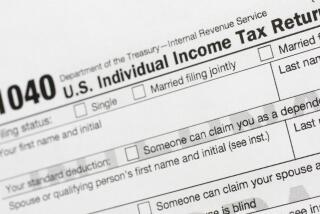Unpaid Tax Total Put at $195 Billion a Year by IRS
WASHINGTON — Internal Revenue Service Commissioner Charles O. Rossotti disclosed Friday that Americans are failing to pay $195 billion annually in taxes owed to the federal government, the highest estimate ever of the so-called tax gap.
The disclosure--coming on the fourth day of Senate hearings marked by sharp criticism of the IRS and its tactics--served as a potent reminder that the agency’s much-maligned enforcement efforts serve an important function. The revelation also underscored that attacks on the agency’s credibility carry risks to the overall tax collection effort.
“It is critical that the public have confidence in IRS’ ability to fight tax evasion and [that] the criminal investigation division is beyond reproach,” Rossotti told the Senate Finance Committee.
The agency’s criminal division was badly damaged by disclosures of serious misconduct made during this week’s hearings. Responding to the testimony, Rossotti pledged full investigations into the allegations that IRS employees had issued illegal threats to taxpayers, stolen government property, concocted bogus investigations against political leaders and mishandled multimillion-dollar audits of corporations.
The commissioner, appointed last year to overhaul the troubled agency, outlined a seven-point program to deal with the problems, including initiating several independent investigations.
But the problem of widespread tax cheating offered a dramatic counterpoint to the tales of IRS misconduct and the agency’s pledge to create a more friendly image.
“Customer service is well and good, but that will not close the tax gap,” one IRS employee said in an interview.
The $195-billion annual gap--prior estimates had put it at anywhere from $70 billion to $140 billion--is enough to pay for all of Medicare, the program that provides medical and disability assistance for 38 million older Americans.
It is more than 75% of the entire defense budget.
And if the IRS were able to capture that money, the federal government could cut taxes by $1,600 for every American family or individual filing an honest tax return, Rossotti said.
Rossotti called for Congress’ Joint Committee on Taxation, the Treasury Department and the IRS to work together to conduct a major review of “willful noncompliance,” seeking to determine the extent of cheating and find measures to reduce it.
Rossotti, as well as most tax experts, believes that one key is for the IRS to update its obsolete computer systems, which are unable to provide sophisticated monitoring of tax records.
Cheating notwithstanding, for the federal fiscal year ending Sept. 30, the IRS estimates it will collect $1.6 trillion.
The tax gap deals only with the legitimate economy and does not include taxes on unreported illegal income, such as from drugs, prostitution or illegal gambling. The IRS has never attempted to estimate losses on that part of the underground economy.
The new figure was provided by the IRS’ office of tax compliance research, whose last estimate was made in 1992. Even the current estimate, Rossotti acknowledged, is merely an extrapolation based on outdated understanding of tax cheating.
IRS officials dropped plans in 1995 to conduct compliance audits, in which random taxpayers are subjected to a full-blown examination of every line of their return. Those audits, the last of which were conducted in 1988, are used to estimate the amount of tax cheating.
Since 1988, the U.S. economy has undergone substantial change, and it is unclear whether Americans are cheating more or cheating less, tax experts say.
The IRS suspects that 6 million Americans fail to file any tax returns, but it lacks the resources to go after all of them. IRS officials say the problem is growing among self-employed doctors, lawyers and other high-income Americans who do not have W-2 forms filed with the IRS.
Although committee members harshly attacked the IRS this week, it spared Rossotti any tough questioning during Friday’s two-hour hearing.
Sen. Phil Gramm (R-Texas) directed a few barbs at Rossotti, calling on him to round up 50 of his agency’s worst employees and fire them for the kind of misconduct that was disclosed at the hearings.
“I have no confidence in the Internal Revenue Service of this country,” Gramm said. “You do not have a good system. This agency has too much unchecked power.”
Rossotti hardly took exception, acknowledging that the IRS must restructure itself and bring in new personnel.
After the hearing, Rossotti posed with members of the panel for photographers.
On Tuesday, Rossotti named former FBI Director William H. Webster to conduct an outside probe of the agency’s criminal investigation division. In March, Rossotti named former General Accounting Office chief Charles A. Bowsher to examine the IRS inspection service, the internal investigating arm of the agency.
In other actions Friday, Rossotti said he would create a complaint system for taxpayers with problems involving the criminal investigation division, would launch a centralized disciplinary process for the division and would increase oversight of the criminal enforcement division by the Treasury Department.
More to Read
Sign up for Essential California
The most important California stories and recommendations in your inbox every morning.
You may occasionally receive promotional content from the Los Angeles Times.











